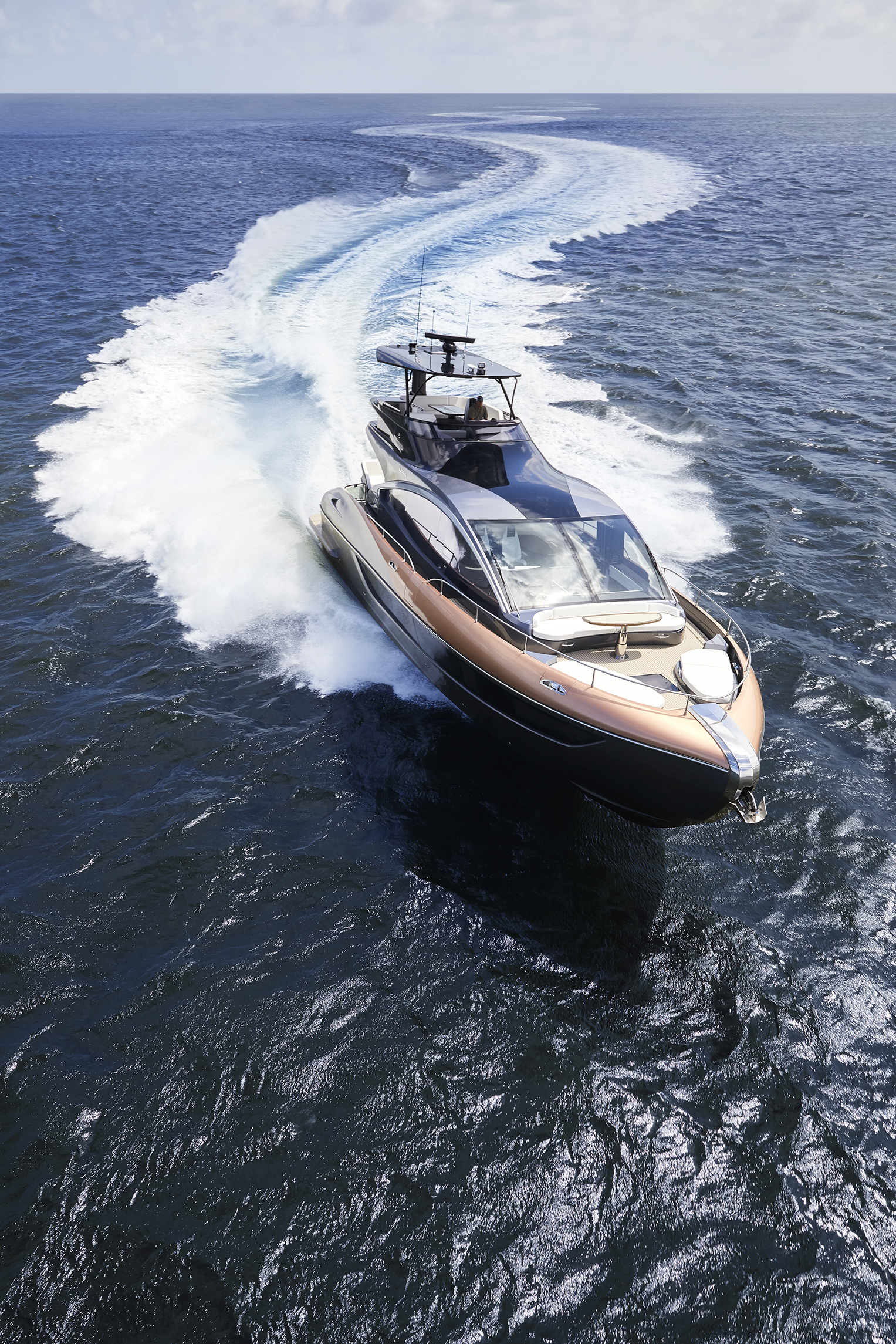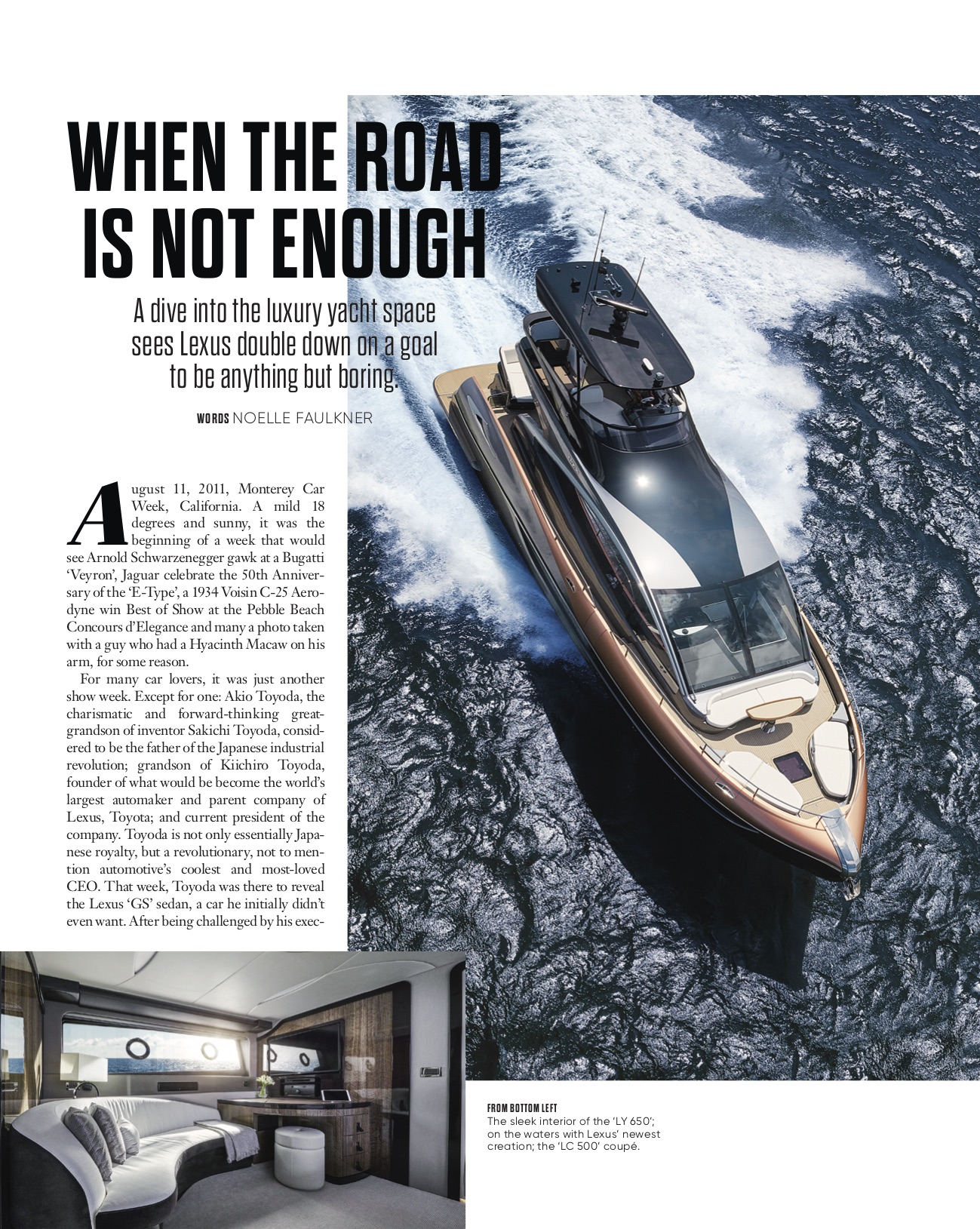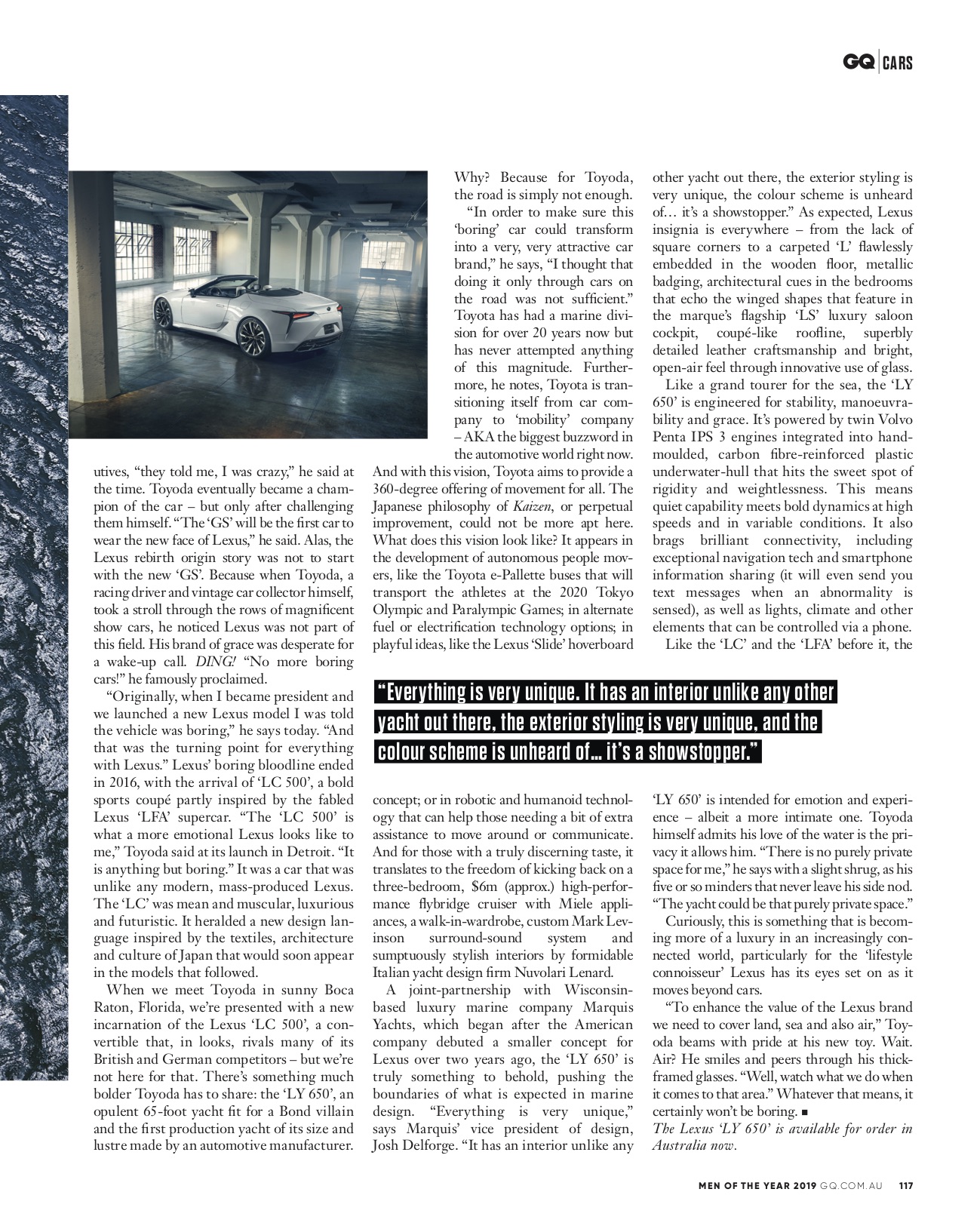
GQ, December, 2019 (PDF)
A dive into the luxury yacht space sees lexus double down on a goal to be anything but boring.


August 11, 2011, Monterey Car Week, California. A mild 18 degrees and sunny, it was the beginning of a week that would
see Arnold Schwarzenegger gawk at a Bugatti ‘Veyron’, Jaguar celebrate the 50th Anniver- sary of the ‘E-Type’, a 1934 Voisin C-25 Aero- dyne win Best of Show at the Pebble Beach Concours d’Elegance and many a photo taken with a guy who had a Hyacinth Macaw on his arm, for some reason.
For many car lovers, it was just another show week. Except for one: Akio Toyoda, the charismatic and forward-thinking great- grandson of inventor Sakichi Toyoda, considered to be the father of the Japanese industrial revolution; grandson of Kiichiro Toyoda, founder of what would be become the world’s largest automaker and parent company of Lexus, Toyota; and current president of the company. Toyoda is not only essentially Japanese royalty, but a revolutionary, not to men- tion automotive’s coolest and most-loved CEO. That week, Toyoda was there to reveal the Lexus ‘GS’ sedan, a car he initially didn’t even want. After being challenged by his executives, “they told me, I was crazy,” he said at the time. Toyoda eventually became a champion of the car – but only after challenging them himself. “The ‘GS’ will be the first car to wear the new face of Lexus,” he said. Alas, the Lexus rebirth origin story was not to start with the new ‘GS’. Because when Toyoda, a racing driver and vintage car collector himself, took a stroll through the rows of magnificent show cars, he noticed Lexus was not part of this field. His brand of grace was desperate for a wake-up call. DING! “No more boring cars!” he famously proclaimed.
“Originally, when I became president and we launched a new Lexus model I was told the vehicle was boring,” he says today. “And that was the turning point for everything with Lexus.” Lexus’ boring bloodline ended in 2016, with the arrival of ‘LC 500’, a bold sports coupé partly inspired by the fabled Lexus ‘LFA’ supercar. “The ‘LC 500’ is what a more emotional Lexus looks like to me,” Toyoda said at its launch in Detroit. “It is anything but boring.” It was a car that was unlike any modern, mass-produced Lexus. The ‘LC’ was mean and muscular, luxurious and futuristic. It heralded a new design lan- guage inspired by the textiles, architecture and culture of Japan that would soon appear in the models that followed.
When we meet Toyoda in sunny Boca Raton, Florida, we’re presented with a new incarnation of the Lexus ‘LC 500’, a convertible that, in looks, rivals many of its British and German competitors – but we’re not here for that. There’s something much bolder Toyoda has to share: the ‘LY 650’, an opulent 65-foot yacht fit for a Bond villain and the first production yacht of its size and lustre made by an automotive manufacturer.
Why ? Because for Toyoda, the road is simply not enough. “In order to make sure this ‘boring’ car could transform into a very, very attractive car brand,” he says, “I thought that doing it only through cars on the road was not sufficient.” Toyota has had a marine division for over 20 years now but has never attempted anything of this magnitude. Furthermore, he notes, Toyota is transitioning itself from car company to ‘mobility’ company – AKA the biggest buzzword in the automotive world right now. And with this vision, Toyota aims to provide a 360-degree offering of movement for all. The Japanese philosophy of Kaizen, or perpetual improvement, could not be more apt here. What does this vision look like? It appears in the development of autonomous people movers, like the Toyota e-Pallette buses that will transport the athletes at the 2020 Tokyo Olympic and Paralympic Games; in alternate fuel or electrification technology options; in playful ideas, like the Lexus ‘Slide’ hoverboard concept; or in robotic and humanoid technology that can help those needing a bit of extra assistance to move around or communicate. And for those with a truly discerning taste, it translates to the freedom of kicking back on a three-bedroom, $6m (approx.) high-performance flybridge cruiser with Miele appliances, a walk-in-wardrobe, custom Mark Levinson surround-sound system and sumptuously stylish interiors by formidable Italian yacht design firm Nuvolari Lenard.
A joint-partnership with Wisconsin-based luxury marine company Marquis Yachts, which began after the American company debuted a smaller concept for Lexus over two years ago, the ‘LY 650’ is truly something to behold, pushing the boundaries of what is expected in marine design. “Everything is very unique,” says Marquis’ vice president of design, Josh Delforge. “It has an interior unlike any ther yacht out there, the exterior styling is very unique, the colour scheme is unheard of... it’s a showstopper.” As expected, Lexus insignia is everywhere – from the lack of square corners to a carpeted ‘L’ flawlessly embedded in the wooden floor, metallic badging, architectural cues in the bedrooms that echo the winged shapes that feature in the marque’s flagship ‘LS’ luxury saloon cockpit, coupé-like roofline, superbly detailed leather craftsmanship and bright, open-air feel through innovative use of glass.
Like a grand tourer for the sea, the ‘LY 650’ is engineered for stability, manoeuvrability and grace. It’s powered by twin Volvo Penta IPS 3 engines integrated into hand- moulded, carbon fibre-reinforced plastic underwater-hull that hits the sweet spot of rigidity and weightlessness. This means quiet capability meets bold dynamics at high speeds and in variable conditions. It also brags brilliant connectivity, including exceptional navigation tech and smartphone information sharing (it will even send you text messages when an abnormality is sensed), as well as lights, climate and other elements that can be controlled via a phone.
Like the ‘LC’ and the ‘LFA’ before it, the‘LY 650’ is intended for emotion and experience – albeit a more intimate one. Toyoda himself admits his love of the water is the privacy it allows him. “There is no purely private space for me,” he says with a slight shrug, as his five or so minders that never leave his side nod. “The yacht could be that purely private space.”
Curiously, this is something that is becoming more of a luxury in an increasingly connected world, particularly for the ‘lifestyle connoisseur’ Lexus has its eyes set on as it moves beyond cars.
“To enhance the value of the Lexus brand we need to cover land, sea and also air,” Toyoda beams with pride at his new toy. Wait. Air? He smiles and peers through his thick- framed glasses. “Well, watch what we do when it comes to that area.” Whatever that means, it certainly won’t be boring.
The Lexus ‘LY 650’ is available for order in Australia now.